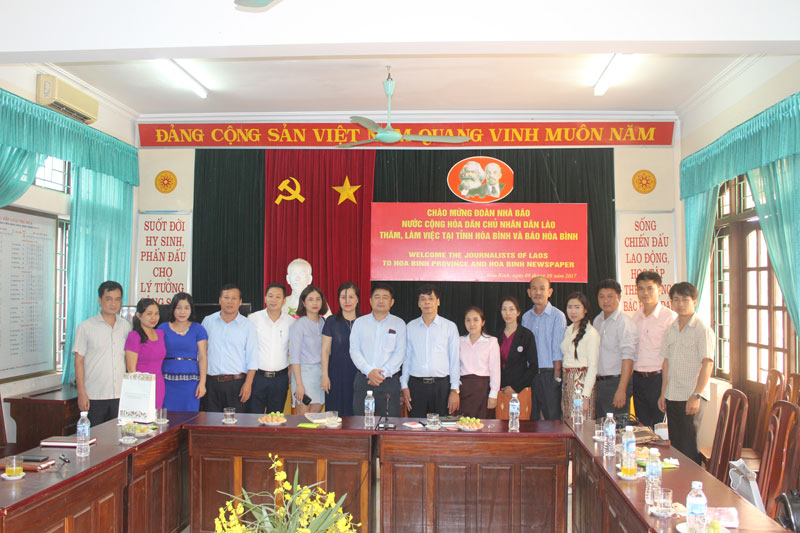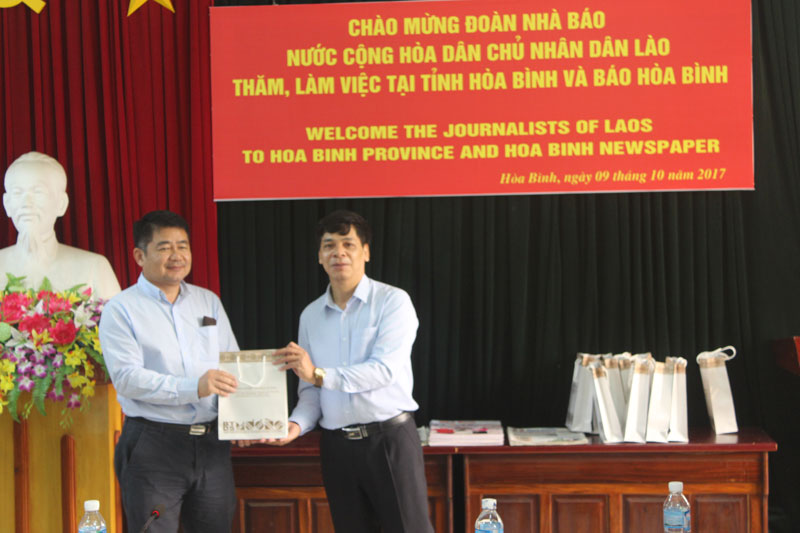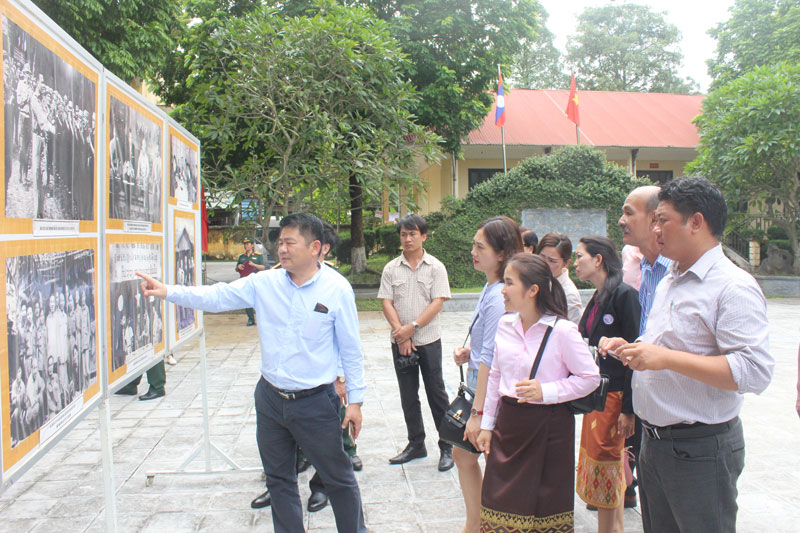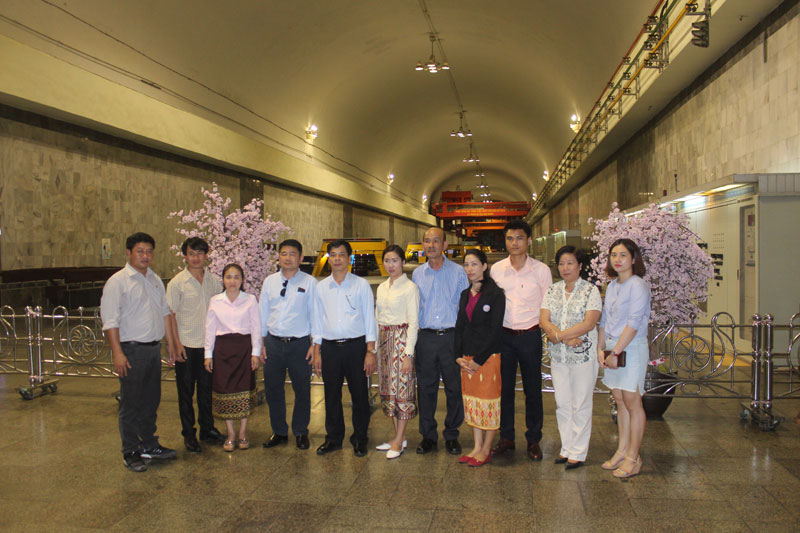
(HBO) – A press delegation from the Lao People's Democratic Republic led by Somsavath Phongsa, deputy head of the Press Department under the Lao Ministry of Information, Culture and Tourism, has paid a working visit to Hoa Binh newspaper.
The delegation included heads, deputy heads, specialists, reporters of the Lao Press Department, Lao National Television, Lao News Agency, and Department of Information, Culture and Tourism from Oudomxay, Xayabuli provinces.
Dinh Van On, Editor-in-Chief of Hoa Binh
newspaper and deputy editors-in-chief, reporters and staff of the newspaper
welcomed the guests.

Lao
journalists and Hoa Binh newspaper’s officials and reporters at the working
session
Amid the open and friendly atmosphere,
Editor-in-Chief of Hoa Binh newspaper Dinh Van On expressed his pleasure to
receive the Lao press delegation to visit
Vietnam and Hoa Binh province.
He said the sound
cooperative ties between the two countries’ press agencies over the past time
have significantly contributed to strengthening bilateral solidarity. He
highlighted the close relations between Hoa Binh province and
Laos’ twinning
provinces of Houaphanh and Luang Prabang.
Dinh Van
On, Editor-in-Chief of Hoa Binh newspaper presents a gift to Somsavath Phongsa,
deputy head of the Lao Press Department
At the working session, Dinh Van On introduced
the development of Hoa Binh newspaper as well as Hoa Binh province over the
past few years to Lao journalists.
The Lao
press delegation visits the relic site where political training classes and the
preparatory session of the second congress of the Lao People’s Revolutionary
Party took place at the campus of the provincial Military High Command
The two sides exchanged issues of mutual
concerns such as press publishing, experience to have interesting press
products, attracting readers, operation of a press agency, and personnel
organisation, along with difficulties and advantages in the development roadmap
of Hoa Binh e-newspaper.
Somsavath Phongsa, deputy head of the Press
Department under the Lao Ministry of Information, Culture and Tourism,
expressed his pleasure to lead Lao journalists to visit
Vietnam this
time.
He thanked leaders, staff and reporters of Hoa Binh newspaper for their warm welcome
and congratulated the newspaper on achievements it has gained over the past
time. He said his visit aims to learn and share professional experience with
the Vietnamese counterparts to serve the socio-economic development of
Laos at
present.
He noted that the experiences in operation and development of the Vietnamese
press in general and Hoa Binh newspaper in particular are valuable for the Lao
press, especially when
Laoshas seen remarkable achievements in communications in the digital era. He hoped
to continue building close relations with Vietnamese press agencies, including
Hoa Binh newspaper in the coming time.
On the occasion, the Lao press delegation
offered incense to pay tribute to Uncle Ho at his statue, visited the Hoa Binh
hydropower plant and the relic site political training classes and the
preparatory session of the second congress of the Lao People’s Revolutionary
Party took place at the campus of the provincial Military High Command.
The Lao
press delegation visits the Hoa Binh hydropower plant
Hoa Binh province is undergoing a dynamic transformation amid Vietnam’s national digital transition. Building on Poliburo’s Resolution No. 57-NQ/TW on breakthroughs in science, technology, innovation, and national digital transformation, the province has rolled out a wide range of practical action plans. A standout initiative is the "Digital Literacy for All” movement, an effort to ensure that no one is left behind in the digital era.
Hoa Binh province is undergoing a dynamic transformation in the wake of the national digital transformation movement. Building on Resolution No. 57-NQ/TW of the Politburo on breakthroughs in science, technology, innovation, and national digital transformation, the province has implemented a wide range of practical action plans. A standout initiative is the "Digital Literacy for All” movement ambitious effort to ensure that no one is left behind in the digital age.
With a spirit of unity and proactive problem-solving, the Party Committee, the government and the people of Dong Lai Commune (Tan Lac District) have made great strides in implementing the resolutions of the 24th Party Congress of the commune for the 2020 - 2025 term. Focusing on leadership and practical actions, the commune has brought the Party’s resolutions into daily life, creating strong impacts and pushing the local development forward.
Amid the nationwide push for digital transformation, young people in Hoa Binh Province are stepping up as dynamic pioneers, applying technology to enhance Youth Union operations and expand the reach of youth-led initiatives. Through creativity and adaptability, Youth Union organizations at all levels have introduced a series of practical solutions, contributing to modern governance and community development.
In recent years, An Nghia commune, located in Lac Son district, has stepped up administrative reform, focusing on improving the quality and efficiency of its single-window service unit for receiving and processing administrative procedures. These improvements have helped create favourable conditions for local residents and organisations to handle administrative procedures, contributing to the commune’s broader socio-economic development.
The Prime Minister-approved master plan to develop the multi-use value of forests ecosystems through 2030, with a vision to 2050, aims to improve the management and sustainable use of forest resources, create jobs, increase incomes, and improve the living standards of ethnic minorities, people in mountainous and remote areas, forest workers and those living near forests.






